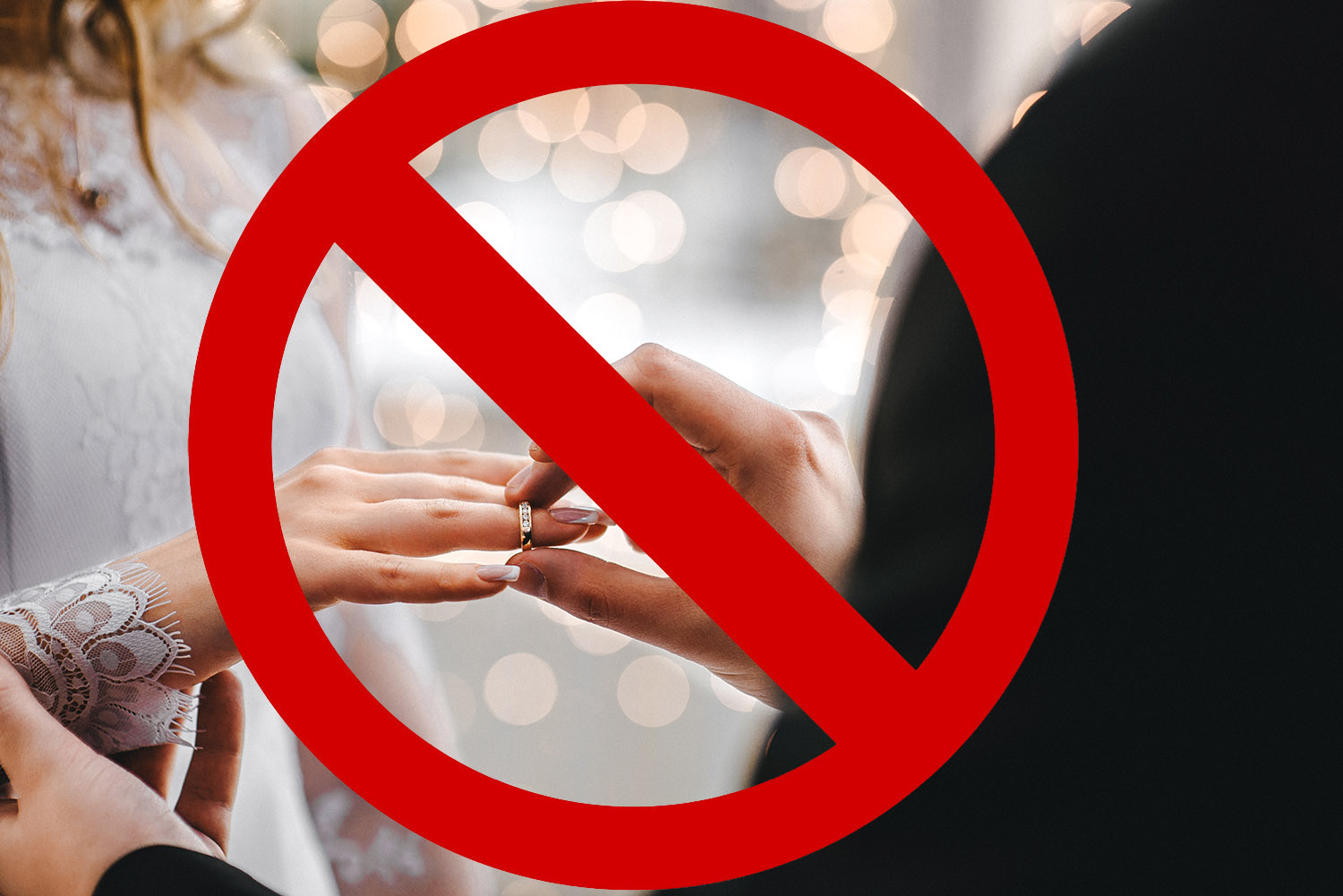As a psychiatrist one of the most damaging situations I encounter is an unhealthy, dysfunctional marriage. While there are many factors that contribute to strained and broken marriages, one major problem is failing to find a suitable partner from the outset.
One factor in failing to find a suitable life partner is the reason that motivates one to marry. Over the years I have seen and heard many stories and have compiled my top ten list of reasons NOT to get married, reasons that have motivated people to marry, but which inevitably lead to problems and stress in the marriage.
Here are my top 10 reasons NOT to get married:
10. Because all your friends are getting married:
This reason usually strikes those in their twenties, when shortly after graduating college they have been to too many weddings, been the brides maid, but never the bride, the groomsman but never the groom. A certain fear begins to rise within the mind, a fear of being alone, of never finding their “soul mate.” With this anxiety, fear, insecurity, they begin an almost desperate search for someone, and when a person comes along, who shows interest in them, even if not possessing the qualities they know are necessary, (like a common faith), they compromise because they don’t want to end up the “old maid.”
9. Because you are getting older
The wheel of time just keeps turning, and one day life’s business has caught up. College degree has been obtained, career is secure, home is established, but along the way time was never taken to find a life partner and now age is creeping up. The fear of no one to share life with rises, of being alone in ones later years. So, join an online dating service, meet person after person, experience the torrent of emotional highs and lows, and marry from loneliness not love, only to find, though married, you are every bit as alone.
8. To advance your career
School is expensive, you can’t possibly both work to pay your way and make your grades – what to do? Get a spouse to put you through school. Or perhaps, your culture demands you marry into a certain family in order to advance your station or office. Motives such as these rarely bring happiness, but instead add untold heartache and stress.
7. To obtain citizenship
Over the years I have had a handful of patients who have married for this reason. Not once have they actually been happy. The spouse with US citizenship never felt truly secure. During the first few years, where divorce would have meant the non-US spouse would not have obtained citizenship there was fear and insecurity, doubt as to whether the marriage was for love, or other reasons. And once citizenship was obtained, divorce followed.
6. To improve finances
While there are certain financial advantages to marriage, marrying for finances is a bad idea. Many patients come to see me who have married a spouse of means, but they themselves have no way to support themselves. All too often the financially dependent spouse feels insecure, inferior, afraid, and if the financially well off spouse acts domineer or controlling, which frequently happens, the dependent spouse is generally too fearful to stand up for what is right and call the offending spouse to account. I have many patients who suffer from chronic depression because they are in marriages in which they are dominated and controlled but rather than leaving, or standing up to mistreatment, submissively stay because of the financial security the marriage provides.
5. To run away or escape a bad home
The sad reality is there are many dysfunctional homes in which children are mistreated, unloved, neglected. While seeking to escape such circumstances is reasonable, too often young people, in such situations, flee into impulsive marriages as a means of escape. The likelihood of such a marriage being healthy is very remote and typically the marriage is fraught with fear, insecurity, conflict and even abuse. All too often those who marry, as an escape, realize they have jumped from the frying pan into the fire.
4. To feel accepted, loved, or wanted
Feelings are powerful and healthy loving relationships will necessarily contain powerful, positive feelings of love, joy, peace, attraction, arousal, expectancy, and happiness. Yet, while healthy relationships will contain such feelings, such feelings are not evidence the relationship is healthy. Feelings are fleeting and transient, and relationships that are primarily feelings driven are generally unstable and unhealthy. Persons who seek relationships to feel accepted, loved, or wanted, are not seeking to find someone to love, but to find someone to love them. They are not seeking to give of self to love others, but are seeking to take emotional energy from others to sustain and support their own insecure and fearful selves. Such relationships are not love relationships, but dependency relationships and inevitably result in increased fear and insecurity over time.
3. Because of pregnancy
I have had many couples come to see me, often married for more than a decade, that suffer from chronic unresolved tension, insecurity, conflict, resentment and who tolerate each other but don’t really enjoy each other. As I explore the history some of these couples started out on very healthy ground, positive dating, loving affection, caring for each other, and both hearts longing for marriage, yet with engagement and marriage plans not yet made. Then, sadly, a pregnancy occurs and, out of obligation, or a sense of duty, because it is “the right thing” they marry. And the foundation of love is fractured and replaced by love crushing, freedom destroying, responsibility and obligation they must now endure. The pregnancy causes the couple to no longer experience their union as freely chosen, but as situationally forced upon them. Because love only grows in an atmosphere of freedom, as soon as their experience of togetherness is no longer freely chosen, but obligated by circumstances, love begins to die.
2. To have sex
Typically this only happens to the foolish, young and religiously rigid. But such a motive is not about loving another person, rather it is about gratifying self. Healthy marriages are built on other-centered love, so when a marriage is founded upon self-gratification, healthy love often fails to grow and the marriage devolves into each party seeking to get what they can from the other.
1. Because you have had sex and feel obligated or guilty
Perhaps this reason has contributed to more dysfunctional, unhappy, and miserable marriages than any other. From religiously pious homes young people are taught the value of abstinence until marriage, yet in our weakened humanity too many are overcome by the passion of heated moments. In the aftermath of such mistakes, a guilty conscience convicts and too many immature young people, as a way of avoiding their conscience, conclude “well in God’s eyes we are already married so if I marry the person It will make it okay.” And, sadly they pursue marriage, deluding themselves into believing it is love and God’s will they follow this course, a course established not by truth, not by principle, not by evidence, not by God’s leading, but by powerful sexual feelings and impulse, confounded by guilt and ignorance of God’s grace.
So, if you are single, and contemplating marriage, don’t fall into the pitfall of marrying for 10 of the worst reasons possible. As my mother used to say, two wrongs don’t make a right. Regardless of with what issues you struggle, what mistakes have been made, or what challenges you face, do not marry as a means to solve your problems. Instead, become the healthiest person, through God’s grace, you can become, and seek someone for your marriage partner with whom you find your greatest joy in loving, and who in turn loves you!











 using your credit or debit card (no PayPal account needed, unless you want to set up a monthly, recurring payment).
using your credit or debit card (no PayPal account needed, unless you want to set up a monthly, recurring payment). instead?
instead?